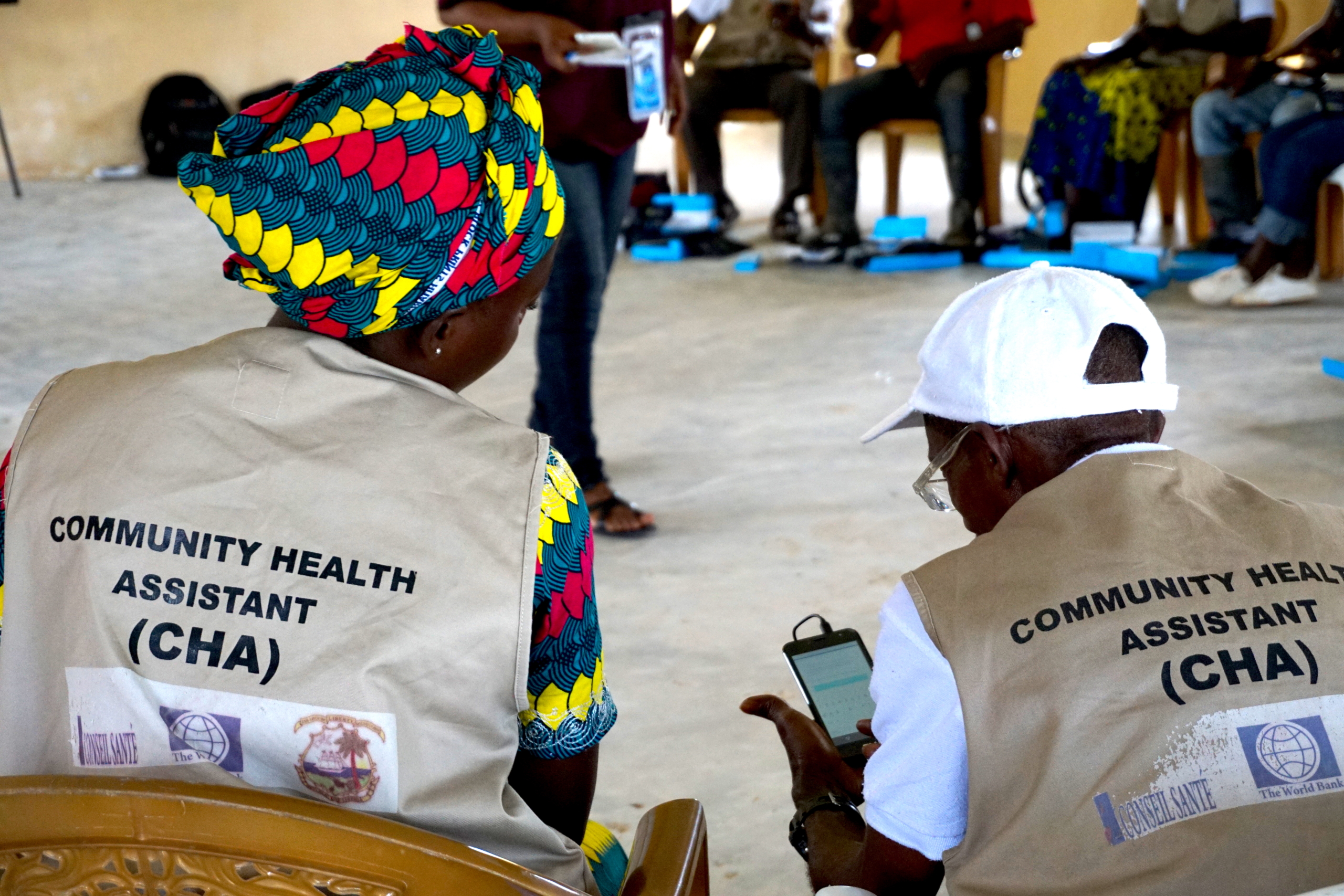In September 2019, Last Mile Health supported the Ministry of Health to achieve a significant milestone: distribution of smartphones and accessories to 100% of the community and frontline health workers in Liberia’s National Community Health Assistant Program. This historic achievement is particularly notable given the operational challenges. Ministry-led teams had to navigate underdeveloped road networks at the height of the rainy season, and community and frontline health workers traversed dense rainforest by motorbike and on foot to attend trainings.

Community and frontline health workers explore the Community Health Academy application following the distribution of mobile phones by the Grand Cape Mount County Health Team and Last Mile Health.
In the 14 counties where the program is currently active, community and frontline health workers are now equipped with the Community Health Academy application—powered by Oppia Mobile—which delivers educational text, video, and quiz content while collecting detailed data on user activity. This content, developed in conjunction with the Ministry of Health and implementing partners, is part of a wider effort to digitize and enhance the National Community Health Assistant Program curriculum. Currently, smartphones are equipped with information on malaria and malnutrition from the national curriculum.
While many countries within sub-Saharan Africa boast high levels of mobile phone use and are innovators in the mobile technology industry, Liberia’s limited telecommunications infrastructure—compounded by dense tropical rainforest and frequent rain—means connectivity is often sporadic and unreliable. To address these challenges, the Ministry of Health will distribute newly developed content from the curriculum using Bluetooth capabilities uniquely suited for Liberia’s largely offline last mile environment.
Around-the-clock access to engaging multimedia clinical content allows community and frontline health workers to explore new ways of learning and strengthens their diagnostic and treatment skills directly in their communities. Early feedback indicates community and frontline health workers find watching real-life patient symptoms depicted in video for the very first time incredibly empowering—a stark contrast to two-dimensional illustrations and text descriptions common in bulky paper-based training manuals. “When I watch these videos, I can see the symptoms, I can compare and know whether I should treat the child or refer him to the facility,” remarked Nathaniel Paye, a community health worker from Rivercess County.
This milestone has the potential to serve as a foundation for further innovation—in the hands of Liberia’s community and frontline health workers, these devices can be leveraged and repurposed for future deployments of innovative digital health tools to enhance service delivery via the National Community Health Assistant Program—including applications for vaccine tracking, service delivery data collection, and other diagnostic tools.
Of note, in partnership with Gavi, the Vaccine Alliance and Last Mile Health, the Ministry of Health is developing new immunization content for the National Community Health Assistant Program’s training curriculum. Future distribution of this content via Oppia Mobile in mid 2020 aims to ensure community and frontline health worker knowledge on immunization is up to date and support improved service delivery—ultimately contributing to global efforts to reach the final 20% of children in remote and fragile settings who are missing out on a full course of basic vaccines.
Last Mile Health is leveraging lessons learned from the digital deployment in Liberia to explore the potential of digital technology to enhance health workforce needs in other countries. While more than 3,600 providers in Liberia continue to use the smartphone-based Academy platform for modules like childhood malaria and malnutrition, Last Mile Health is also partnering with Ethiopia’s Federal Ministry of Health to develop plans to scale the Community Health Academy’s application and customized content to over 35,000 health workers in their national program. Countries like Liberia and Ethiopia are demonstrating how digital health can be leveraged as a means of boosting health worker knowledge and skills, optimizing performance, and ultimately improving the quality of healthcare for millions of people living in the world’s most remote communities.




